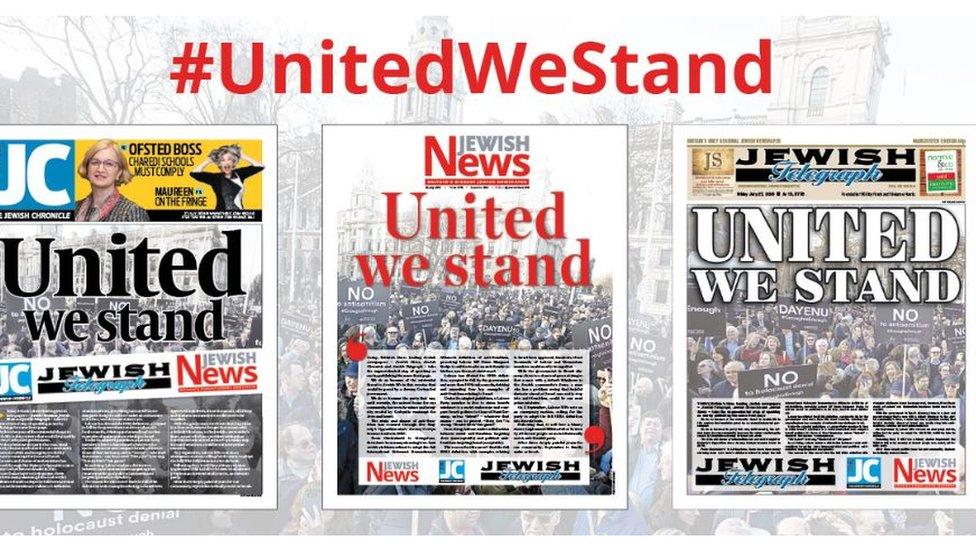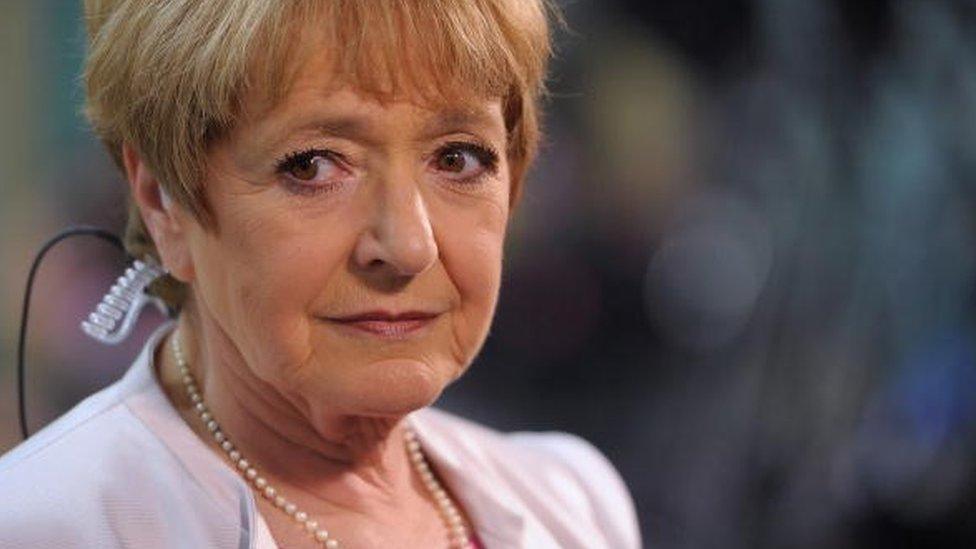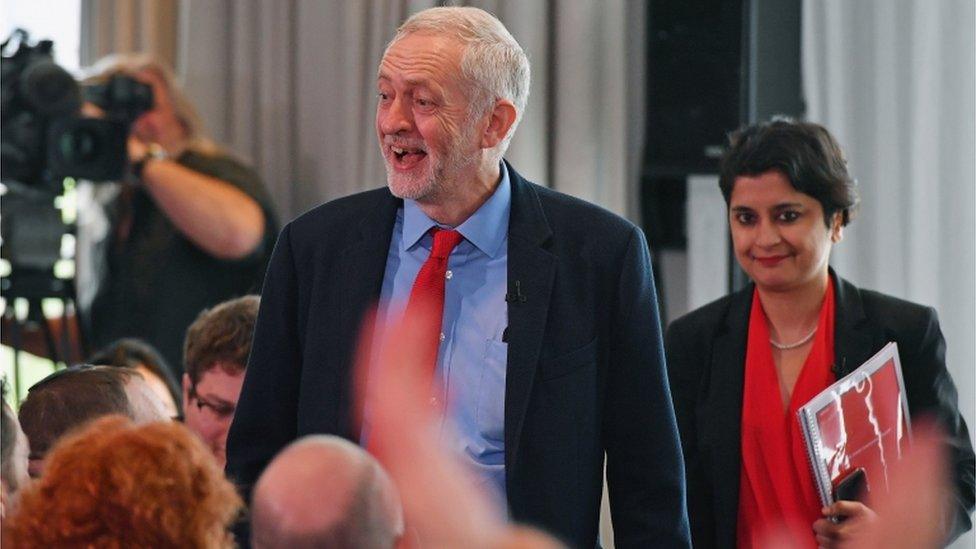Jewish newspapers unite against Labour 'threat'
- Published

The UK's three main Jewish newspapers have published the same front page, warning that a Jeremy Corbyn-led government would pose an "existential threat to Jewish life".
The Jewish Chronicle,, externalJewish News, external and Jewish Telegraph, external move comes amid anger over Labour's anti-Semitism code.
They say the party must sign up to the International Holocaust Remembrance Alliance's definition of anti-Semitism.
Labour says its version "expands on and contextualises" the IHRA definition.
The party added the security and wellbeing of Jewish people was a priority and a Labour government would pose "no threat of any kind" to Jewish people.
Labour's new code of conduct was approved by its National Executive Committee last week, but it has been criticised by Jewish leaders and some of its own MPs.
Although it includes the definition of anti-Semitism given by the IHRA, it has not included all of the body's "working examples".
Labour MPs will vote in September on whether to adopt the full IHRA wording after passing an emergency motion at a meeting on Monday night.
Under the same headline, "United we stand", the newspapers said Labour had "diluted" the IHRA definition in its new code and there was a "stubborn refusal" from the party to accept it.
They said the party had the choice of accepting the definition or "be seen by all decent people as a racist, anti-Semitic party".
"The stain and shame of anti-Semitism has coursed through Her Majesty's Opposition since Jeremy Corbyn became leader in 2015," the papers say.
Labour veteran Dame Margaret Hodge confronted Mr Corbyn in the Commons last week, reportedly swearing at him and calling him an anti-Semite.
Speaking to BBC political editor Laura Kuenssberg, the MP said she "blew my top" when she found out Labour had, despite criticism, written its anti-Semitism guidelines in such a way.
"And I thought rather than do what politicians usually do, and talk each other down behind our backs, I would go and confront him," she added.
The party launched a disciplinary inquiry into the MP, which shadow defence secretary Nia Griffith has called "completely absurd".
Speaking on Nick Robinson's Political Thinking podcast, Ms Griffith said: "The idea that Jeremy would want to set up an atmosphere in the party where people couldn't go and say things to him is completely absurd.
"It's just not his way of dealing with things. I think we'd all prefer to have somebody speak to your face rather than behind your back."

Dame Margaret Hodge has been a fierce critic of Labour's new anti-Semitism guidelines
Shadow chancellor John McDonnell felt Dame Margaret had "misunderstood" Labour's new code of conduct.
He told BBC Radio 4's Today programme: "I can understand why she was so angry, if that's what she believed this code had done, and I think it is a complete misunderstanding and we can resolve that amicably."
He said the issue had to be resolved quickly and that Mr Corbyn had asked Labour's chief whip and general secretary to do this.
Asked about Mr McDonnell's comments, Jeremy Corbyn said: "I hope she [Dame Margaret] has now had a chance to read the code of conduct that we agreed at the national executive, and I hope she has had time to reflect that this is a very honest endeavour to ensure we prevent any anti-Semitism rising in our party."
The Labour Party said it was "fully committed to the support, defence and celebration of the Jewish community and its organisations".
"The next Labour government poses no threat of any kind whatsoever to Jewish people," a statement said.
"The security and wellbeing of Jewish people is a priority for our party and in government we will always ensure schools, synagogues and institutions are properly protected.
"We understand the strong concerns raised in the Jewish community and are seeking to engage with communal organisations to build trust and confidence in our party. We know there is a huge amount of work to do."
The party said it was "committed to tackling and eradicating anti-Semitism in all its forms, in our party and our society".
What are the differences?
Labour's code of conduct was drawn up after the 2016 Chakrabarti inquiry. It followed allegations of anti-Semitism within party ranks.
The code does reproduce the IHRA's "working definition" of anti-Semitism and lists behaviours likely to be regarded as anti-Semitic - but critics point out that it leaves out four examples provided by the IHRA definition:
Accusing Jewish people of being more loyal to Israel than their home country
Claiming that Israel's existence as a state is a racist endeavour
Requiring higher standards of behaviour from Israel than other nations
Comparing contemporary Israeli policies to those of the Nazis
But Labour has insisted that while the examples are not reproduced word for word, they are covered elsewhere in the new code.
- Published26 March 2018

- Published6 July 2018
